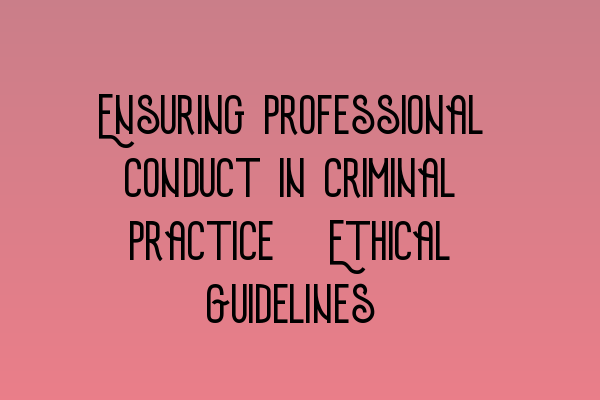Ensuring Professional Conduct in Criminal Practice: Ethical Guidelines
Welcome to the SQE Criminal Law & Practice Law UK blog! Today, we will discuss the importance of professional conduct in criminal practice and provide you with some ethical guidelines to follow. As legal professionals, it is crucial that we maintain the highest level of ethical standards to uphold the integrity of the justice system.
Why Professional Conduct Matters
Professional conduct is the cornerstone of a successful legal practice. It builds trust with clients, colleagues, and the court, and ensures the fair administration of justice. As a criminal law practitioner, your actions and decisions can have substantial impacts on the lives of your clients and the community. Adhering to ethical guidelines not only protects your clients’ rights but also safeguards your own professional reputation.
Ethical Guidelines for Criminal Practice
To help you ensure professional conduct in your criminal practice, we have compiled a list of ethical guidelines:
- Confidentiality: Always maintain strict confidentiality when handling client information. Respect legal privilege and protect sensitive information from unauthorized disclosure.
- Conflict of Interest: Identify and address any potential conflicts of interest that may compromise your impartiality or objectivity. Avoid representing clients with conflicting interests and maintain independence in your decision-making.
- Honesty and Integrity: Be truthful and transparent in all your professional dealings. Do not misrepresent facts, withhold evidence, or engage in any dishonest or fraudulent activities.
- Competence: Strive for excellence in your legal knowledge and skills. Stay up-to-date with the latest developments in criminal law and practice. If you lack proficiency in a particular area, consider seeking further education or consulting with an expert.
- Client Advocacy: Fulfill your duty of zealous advocacy for your clients within the bounds of the law. Act in their best interests and present their cases diligently, vigorously, and ethically.
- Respect and Courtesy: Treat all individuals involved in the legal process with respect and courtesy, including clients, witnesses, opposing counsel, and court personnel. Demonstrate professionalism in your interactions and avoid engaging in disrespectful or unprofessional conduct.
- Impartiality: Maintain impartiality and objectivity in your representation of clients. Avoid personal biases and ensure that your decisions are based on the law and the evidence presented.
- Compliance: Comply with all legal and professional obligations, including the Solicitors Regulation Authority (SRA) Code of Conduct. Stay informed about any changes or updates to ethical rules and regulations.
By adhering to these ethical guidelines, you can foster a professional practice that is committed to justice, integrity, and the highest ethical standards.
Continuous Professional Development and SQE Exams
To further enhance your professional conduct and legal expertise, consider enrolling in SQE 1 and SQE 2 preparation courses. These courses provide comprehensive knowledge and skills that will help you excel in your criminal practice. Additionally, taking SQE 1 practice exam questions and SQE 1 practice mocks FLK1 FLK2 can help you assess your readiness for the actual exams.
Stay informed about the latest SRA SQE exam dates to ensure you have adequate time for preparation. The better prepared you are, the more confident you will be in upholding the ethical guidelines discussed in this article.
Thank you for joining us today as we explored the importance of professional conduct in criminal practice. By following the ethical guidelines outlined above and continuously improving your legal skills, you can contribute to a fair and just criminal justice system.
For more information on SQE 1 and SQE 2 preparation courses, please visit our SQE 2 Preparation Courses and SQE 1 Preparation Courses pages.
Please note that the information provided in this article is for educational purposes only and does not constitute legal advice. Consult with a qualified legal professional for specific advice regarding professional conduct in your jurisdiction.
